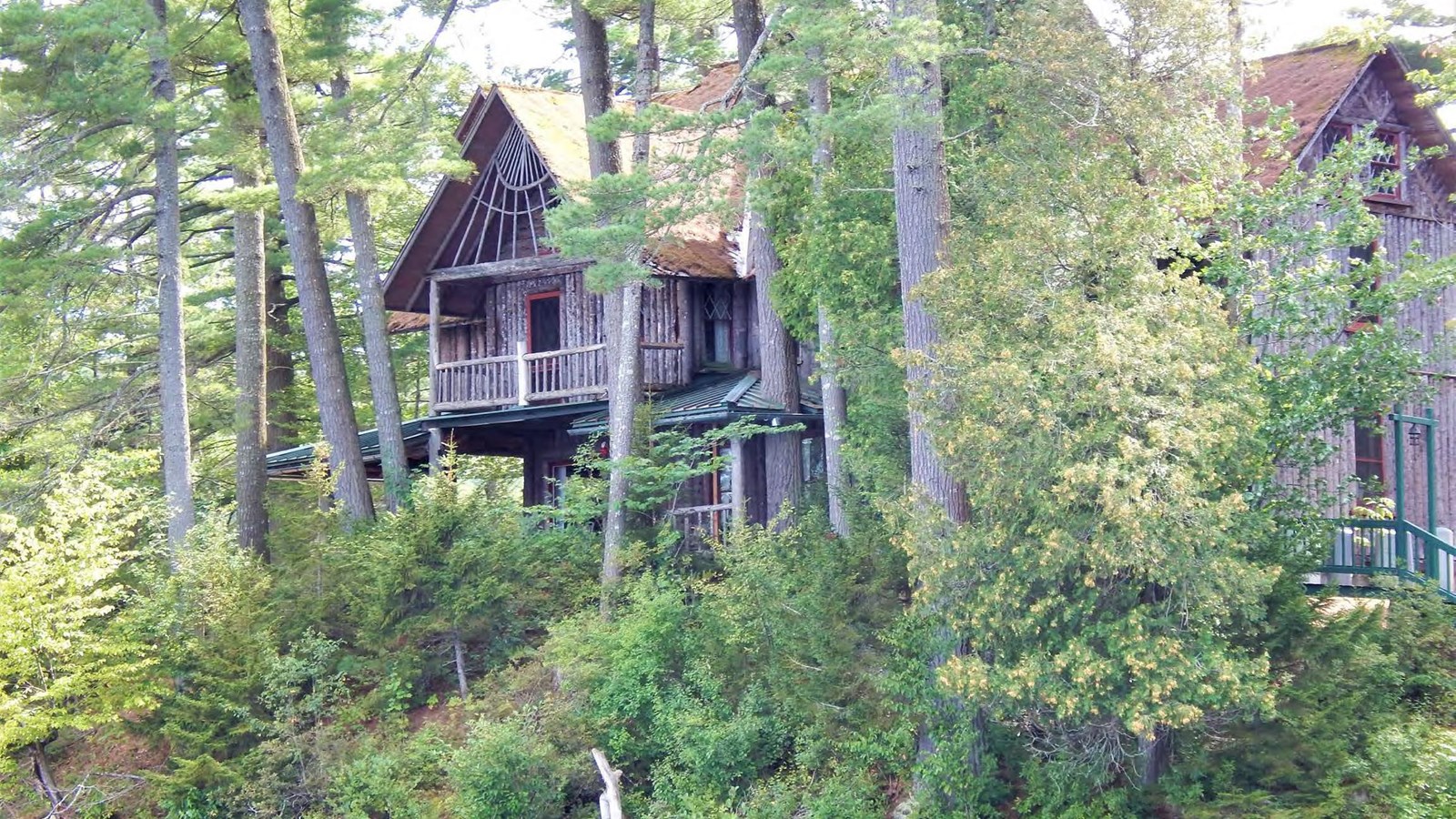Last updated: August 23, 2023
Place
Camp Veery

Photograph by Christine Bush, courtesy of the New York State Historic Preservation Office
Quick Facts
Location:
100 Echo Island, Eagle Bay, New York
Significance:
Architecture
Designation:
Listed in the National Register - Reference number 100009171
OPEN TO PUBLIC:
No
Camp Veery in Eagle Bay, New York was listed in the National Register of Historic Places in 2023. The camp is significant as an example of the Great Camp tradition in the Adirondack region, an architectural style that was popular amongst wealthy urban owners who created seasonal recreational retreats in the late 19th and early 20th century.
The Adirondacks became a popular tourist site in the 1870s and 1880s, as a railroad line made the region more accessible and William H.H. Murray's Adventures in the Wilderness, a bestselling book, encouraged city-dwellers to experience nature. While tourists from all classes enjoyed the Adirondacks, staying in the various guest houses and hotels that were built to meet the surge in demand, wealthier tourists sought to build more private, personal residences. These residences became known as "Great Camps," and were built in a style that was unique to the Adirondacks.
The Adirondack Rustic Style was defined by the use of materials native to the region, like log and stone, the integration of buildings into the natural landscape, a rustic aesthetic, and a tendency to build many separate buildings in a compound plan. Camps designed in this style allowed wealthy urbanites to enjoy many of the same luxuries available in cities, while still maintaining the rustic character of the region.
Camp Veery was constructed by Theodore Page, a shade cloth businessman, on Echo Island in 1900. He named the camp after the Veery bird, a favorite of his wife Kate McCallum. The Page family sold the home to Minnie Maddern Fiske, a prominent Broadway stage actress, in 1921. In 1923 and 1924, the camp operated as a public camp with accomodations for 30 guests, complete with a chef, a beach with a float and springboard, and canoes. During the camp's peak season, guests paid $30-40 a week for a single room with meals.
Today, the camp continues to operate as a private camp and is not open to the public.
The Adirondacks became a popular tourist site in the 1870s and 1880s, as a railroad line made the region more accessible and William H.H. Murray's Adventures in the Wilderness, a bestselling book, encouraged city-dwellers to experience nature. While tourists from all classes enjoyed the Adirondacks, staying in the various guest houses and hotels that were built to meet the surge in demand, wealthier tourists sought to build more private, personal residences. These residences became known as "Great Camps," and were built in a style that was unique to the Adirondacks.
The Adirondack Rustic Style was defined by the use of materials native to the region, like log and stone, the integration of buildings into the natural landscape, a rustic aesthetic, and a tendency to build many separate buildings in a compound plan. Camps designed in this style allowed wealthy urbanites to enjoy many of the same luxuries available in cities, while still maintaining the rustic character of the region.
Camp Veery was constructed by Theodore Page, a shade cloth businessman, on Echo Island in 1900. He named the camp after the Veery bird, a favorite of his wife Kate McCallum. The Page family sold the home to Minnie Maddern Fiske, a prominent Broadway stage actress, in 1921. In 1923 and 1924, the camp operated as a public camp with accomodations for 30 guests, complete with a chef, a beach with a float and springboard, and canoes. During the camp's peak season, guests paid $30-40 a week for a single room with meals.
Today, the camp continues to operate as a private camp and is not open to the public.
